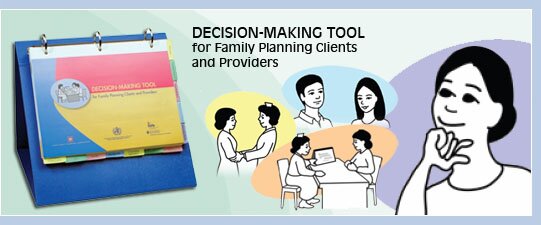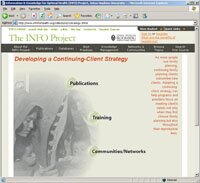 |

|
The purpose of the monthly Spotlight is to showcase health communication materials that have had proven impact.
|
|
 |
|

Adopting a continuing-client strategy can help programs and providers focus on meeting client's needs not only when they first choose family planning but also throughout their reproductive lives.
|
|
DECISION-MAKING TOOL
for Family Planning Clients and Providers
The Decision-Making Tool for Family Planning Clients and Providers promotes high-quality family planning counseling. This tool is a decision-making aid for family planning clients, a job-aid and reference manual for providers, and a training resource. It includes evidence-based technical information on 14 family planning methods, including medical eligibility criteria, side effects, when to start, and how to use each method. The tool is one cornerstone in the World Health Organization's series, Four Cornerstones of Family Planning Guidance.
As more and more people use family planning, continuing clients outnumber new clients by a widening margin. Continuing clients have a variety of reasons for returning to the clinic. Some are satisfied with their method and are returning for re-supply. Others have concerns about their method and want additional counseling, while still others want a different method. Providers can use the Decision-Making Tool to counsel clients based on their reasons for returning. It includes a special section focused specifically on the needs of returning clients. When providers establish a positive interpersonal relationship with their clients and give them good service—by listening to, understanding, and responding to their needs—their clients are more likely to be satisfied and to come back to the clinic.
 Download the Decision-Making Tool Download the Decision-Making Tool
 |
Training videos were made by JHU/CCP/Indonesia to improve use of the Decision-Making Tool translated into Bahasa Indonesia. The tool has been translated into 15 other languages - Arabic, Bengali, Burmese, Chinese, Dari, Divehi, Farsi, French, Hindi, Kosovar, Mongolian, Nepali, Romanian, Spanish, Turkish, and Vietnamese.
|
EVIDENCE OF EFFECTIVENESS
Promoting informed choice: evaluation a decision-making tool for family planning clients and providers in Mexico examines the Decision-Making Tool’s usability and its impact on counseling and decision-making processes during family planning consultations. Results indicate the tool was useful both as a job aid for providers and as a decision aid for clients.
Evaluation of the World Health Organization's family planning decision-making tool: Improving health communication in Nicaragua investigates the Decision-Making Tool’s impact on health communication in Nicaragua. Fifty nine service providers in Nicaragua were videotaped with 426 family planning clients 3 months before and 4 months after attending a training workshop on this tool. After the intervention providers increased their efforts to identify and respond to client needs, involve clients in the decision-making process, and screen for and educate new clients about the chosen method.
CREDITS
The Decision-Making Tool has been developed by the World Health Organization, Department of Reproductive Health and Research, and the INFO Project at the Johns Hopkins Bloomberg School of Public Health/Center for Communication Programs. The Health Communication Partnership (HCP) field tested the tool with funding from the US Agency for International Development.
 See other resources for Interpersonal Communication See other resources for Interpersonal Communication
Back to M/MC Home
|



